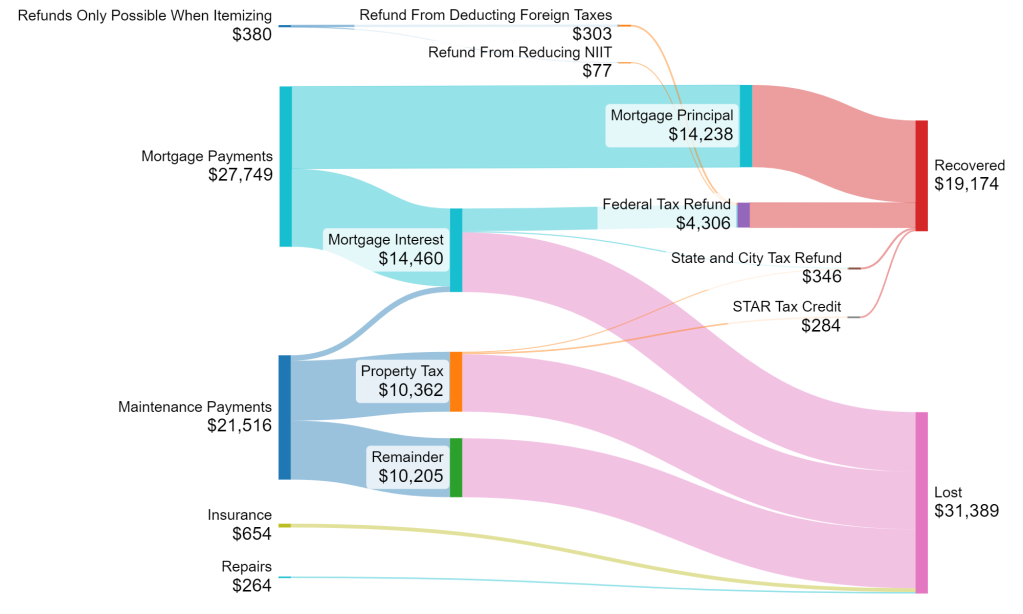tl;dr
- You can usually ask for money or discounts when first entering a transaction (eg. making a purchase or signing a contract), renewing a transaction, or when something goes wrong.
- Prepare to negotiate by doing some research and having competing offers. Sometimes you’ll have to escalate or say you’re going to go to a competitor to succeed.
- I’ve been able to earn and save $100s of thousands by negotiating for jobs, loans, a home purchase, rent, cell phone bills, cable, computers, furniture purchases, flight delays, credit card fees, and billing mistakes.
General Principles
When You Can Ask
Generally, I’ve found you can ask for money or discounts at three big times:
- When first entering a transaction (eg. purchase or contract).
- When renewing a transaction.
- When something has gone wrong.
I’ve found I can usually negotiate in these scenarios:
- A human is selling you something: In some transactions, there is a sales person trying to convince you to commit. For example you have a recruiter when getting a job, a broker when renting an apartment, an agent when applying for a loan, and a sales person when purchasing electronics or a car. Almost every time a person has tried to sell me on something, the dollar amount has been negotiable. In settings where you serve yourself, like a grocery store or online shopping, negotiation is usually not possible (but may be, if you ask to speak to a person1).
- The transaction is large: The more money at stake, the more likely your counterparty is willing to give something up to get the transaction done (and the more likely it’s worth your time to try).
- Margins are high: When goods have very little unit cost, companies are often willing to compromise on prices. For example, cellular infrastructure is very expensive to set up, but putting one more phone on a tower is cheap. So many cell phone companies are willing to cut into their margins to capture your business. They profit whether they are charging you $100 or $40.
In general, the best advice is: When in doubt, try! It can rarely hurt to ask, and you might be surprised where you can succeed.
How to Successfully Ask
To set yourself up for success:
- Come prepared: Search the internet for examples of people’s successes before trying to ask for anything yourself (adding site:reddit.com to your Google search can help find real people’s anecdotes). Sometimes there are specialized sites for a given data set (eg. levels.fyi has great data on tech salaries). Knowing what is possible will let you know when to keep trying, and when to give up.
- Pick trade offs to get what’s most valuable to you: Oftentimes your counterparty will have multiple things they can give you. For example, when negotiating with a company they might be able to move on base salary, stock, bonus percentages, vacation time, or other factors. You might find you can get 2x as much additional stock as base salary, or more easily get a week’s more vacation than a salary bump. Know what your counterparty can give you, and offer to trade off for what you value most. Sometimes, the thing you value has little marginal cost (eg. vacation time), and it will be easier to get than something with a concrete cost (eg. salary).
- Have competing offers: When looking for a job, negotiating mortgage rates, and requesting discounts on cable bills, I’ve had the most success when I can say “X is offering me a better deal”. Many counterparties are only empowered to improve their offer when they are trying to meet or beat a competitor. Note that documentation is not always required; sometimes just knowing what a competitor would offer might be enough.
- Talk to the right people: Not everyone is empowered to offer the same discounts or compensation. Sometimes, especially in customer service settings, you need to politely ask to escalate / speak to a manager. They are often empowered to offer you more. If you’re in a retention scenario (ie. trying to get a discount for not cancelling something), you may need to specifically ask to talk to the “retention department” to get the best deals.
- Say the right things: Some customer service organizations have very particular scripts. For example, I always had to say “I’m thinking of cancelling and switching to your competitor” when negotiating discounts on my parent’s cable bill. Those words somehow unlocked offers that weren’t available moments before. In general, saying you want to cancel is often the key to retention offers.
- Offer an end: Some conversations are open ended, like salary negotiations or requests for compensation after a flight disruption. You can just keep asking for more until the other party won’t go any further. I’ve often found that I can clinch a final deal by offering an end to the requests. For example, I might say “I’ll sign if you give me $X” in a salary negotiation or “My concern will be resolved and I’ll be happy if you can refund $Y” in a compensation discussion.
- Be nice: The person you’re talking to often has some level of discretion for what they can offer you. In addition to just being the decent thing to do, being nice increases the odds that the person you’re talking to will do everything they can to help you out.
Examples
These are my own personal examples of where I’ve been able to get a discount or make some extra money, just by asking.
Negotiating Before a Transaction
Whenever you’re about to make a large transaction, whether hundreds of dollars or hundreds of thousands of dollars, you should be thinking about negotiating. Here are some examples of where I’ve been able to negotiate pre-closing:
- $100,000 – New Job Compensation: Every time I’ve been looking for a job, I’ve been able to negotiate my offers up by talking with the recruiter. In 2023, I was able to negotiate an offer from StubHub up by $25k base salary, and $75k stock (per year). In 2018, I was able to negotiate Facebook up by $10k base salary and $100k stock (over 4 years). These numbers are not out of the norm, and hopefully illustrate just how impactful salary negotiations can be. If you’re in tech, be sure to check out levels.fyi to get a sense of what you might be able to get your offer up to. Also note that most negotiations went through multiple rounds, with multiple increases (the StubHub offer even came after I’d been told they would not budge). The most powerful words I’ve found in my salary negotiations have been “I’ll sign if you get me $X”.
- $49,000 – Home Prices: I was able to knock $49,000 off the price of my apartment purchase by negotiating with the seller.
- $20,750 – Home Renovation Costs: When getting quotes to renovate my apartment, one contractor originally quoted me $81,550 for the job. Simply by expressing my surprise that it was much higher than I’d been expecting, I was able to get him to follow up with a quote for $60,800. That’s a $20,750 reduction. Note that that was still more than I was willing to pay and I ended up going with another contractor, but hopefully that demonstrates these quotes are negotiable.
- $9,429 / 0.25% – Mortgage Rates: I estimated that cumulatively across all the things I did to reduce my mortgage rate, I saved $23,574 in present dollars. I attributed 40% of those savings to my negotiation process, meaning that I saved $9,429 by negotiating. I did all this by working with Citi’s mortgage agent, and convincing them I could find better offers elsewhere.
- $976 / 1.75% – Line of Credit Interest Rates: I was able to work with the Wealth Adviser at Citi to negotiate the rate for my Pledged Asset Line down by 1.75%, which I estimated saved me $976 over the time I needed the loan. I did this by convincing my adviser that I could find a better loan elsewhere, and asking them to offer something even more attractive.
- $750 + Amenity Access – Rent Concessions: When renting an apartment in 2018, the place we found was a huge one bedroom, but we needed a two bedroom. By telling the agent we weren’t willing to pay for the wall to flex it into a two bedroom, we convinced the agent to give us a $750 concession from his commission to cover the cost of the wall and close the deal. When negotiating with the building itself, we asked for free access to the rooftop pool (usually $200 / each), and were also able to get that thrown in.
- $5-200 – Facebook Marketplace Purchases: Marketplace is already a great place to get items at a steep discount, and what makes it better is that everything is negotiable. My best savings came from knocking $200 off a Herman Miller chair. My personal approach is to open with “Hey, I can pick this up today, if you can do $X”, and I set $X on the lowest end of what I think is reasonable (leaving me room to go up if they counter offer).
- ~$50 (freebies) – BestBuy Computer Purchase: Computers are incredibly low margin items, and are nearly impossible to get discounts on by negotiating. Computer accessories, however, tend to be very high margin items. When I went shopping for a new computer for my father, we were able to convince them to throw in some free cables, a mouse, and some software with the purchase. We did this by saying that we’d set a hard budget limit that just so happened to be slightly below the total cost of everything we were trying to buy.
Retention Offers
Once you’re engaged in any sort of transaction with a recurring payment (be it employment, a cell phone plan, or anything else), it is presumably beneficial to your counterparty and they are incentivized to keep you in it. This offers opportunities to extract concessions for maintaining the status quo. Here are some examples of where I’ve been able to get retention offers for staying in a deal:
- $67,783 – Employer Retention Offer: Like many tech companies, my employer offers a large initial stock grant on signing, which vests over 4 years. After 4 years, many employees hit a “cliff”, where their compensation drops significantly because that grant has run out. At my company, the only discretionary lever that my leadership has to adjust compensation is during our once a year performance review process. When my cliff was approaching, I gave my manager many months’ warning that I would need him to pull that lever. I told him I was happy in my job, but would have a strong economic incentive to leave once my cliff had hit, unless he could get me additional equity. In the end, he was able to get me $271,135 in additional equity (vesting over four years), for a $67,783 annual increase in compensation.
- $1200 – Rent Renewal: When considering renewing my lease for another year in 2018, I wrote a friendly email to my landlord telling them I was considering staying, but that I’d like a rent concession. I explained some issues with the apartment (too hot in the winter), the shifting rental market (at the time, many landlords were having to offer concessions to get renters in), and the expected higher cost of them having to find another tenant. In the end, they agreed to a $100 / month ($1,200 / year) rent decrease.
- ~$600 – Cable, Phone, and Internet Bills: My family’s cable, internet, and TV bundle provided my first taste of negotiating. We paid a couple hundred a month for all these services, and in our part of Canada there were two major players: Rogers and Bell. I was consistently able to get ~$50 / month discounts and some freebies thrown in (eg. long distance calling, HBO) by calling in, asking to speak to the retention department, and telling them we were considering switching to their competitor for better prices. I also had similar success negotiating individual cell phone bills for myself and my family.
- $100-$300 – Credit Card Retention Offers: You can often get a credit card issuer to waive your annual fee, or make an offer of a bonus (though usually a smaller one than you can get on initial sign up). Every time one of my annual fees comes up (which is rather frequent, given my habit of acquiring cards for sign up bonuses) I call in, politely explain that I’m not getting enough value from the card to justify the annual fee, and then ask if they are willing to waive it or make a retention offer. Examples of success I’ve had are Amex offering me 30,000 points (easily worth $300) to spend $3,000 on my Amex Gold card, and Capital One waiving my Savor card’s $95 annual fee. You can find an old, but mostly still relevant, guide on credit card retention offers here.
- $273 – New York Times Subscription Discount: I signed up for New York Times’s digital subscription during a $1/week promotion. When it came time to renew at full price (currently $6.25 / week), I went through the cancellation flow on their website, and was automatically offered to renew (with the cooking, games, and other digital offerings thrown in) for the original $1. Now I don’t quite count this as saving ($6.25 – $1.00) * 52 weeks = $273, because I never would have paid full price, but I do still think it’s an interesting example.
- $150 – Citi Checking Account Retention Offer: Sometimes, even checking accounts come with retention offers. I was able to trigger this automated $150 offer from Citi by initiating the cancelation process for my checking account online. All I had to do to earn the bonus was make a single $150 purchase on my debit card.
Complaining After an Issue
Many companies care about customer service, and are willing to offer a financial concession if you contact them about an issue you experienced. Here are some examples of concessions I’ve been able to get:
- $1,662 – IKEA Delivery Hell: In the summer of 2018, IKEA had a bit of a delivery meltdown in New York City. Of the 30 boxes required to assemble the furniture my roommate and I had ordered, three arrived at our apartment. It took hours on the phone, weeks of waiting, and two more shipments for all our furniture to arrive. We ended up having to guess the email of IKEA’s VP of customer service (most companies usually have a firstname.lastname@company.com type structure), and contacted them to finally get support. The net result was a $100 credit, and a full refund of the $1,562 order.
- Airline Issues:
- $1,000 Credit – 24 Hour+ Delays: I have twice experienced delays of 24+ hours, that were the fault of United. Once, a few hour delay on my Newark to Houston flight caused me to miss the once-per-day flight from Houston to Auckland. During the 2022 Christmas travel meltdown, the flight I had booked for my partner was cancelled (due to missing crew, not weather) and rebooked for a later day. For the Auckland flight, I filled out United’s contact form, and requested compensation. I was given a $200 travel certificate, initially, but politely stated that wasn’t enough and asked for more. They then gave me another $400 on top. I followed up one more time and said I’d be happy if they gave me another $400, which they did. For the Christmas flight, one side of the flight was in Canada, so I knew I was entitled to compensation under Canadian law. I again filled out the contact form, and received an offer for either $1,000 CAD payment, or a $1,000 USD travel certificate (of which I took the latter).
- $125 Credit – Running Out of Food on Plane: On a 6 hour flight from New York to San Francisco, United ran out of food on the flight. I reached out through their contact form to complain, and received a $125 travel certificate.
- 10% Discount – Minor Delays: For minor inconveniences, like delays of an hour or two, I usually shoot off an email explaining the inconvenience that was caused and asking for the airline to make it up to me. I’ve consistently had success with Air Canada giving me codes for 10% off my next flight.
- $948 – Damaged / Sub-par Furniture: When I bought furniture for my new apartment, a number of the items arrived with issues. In each case, I contacted support about the issue and asked them to make it right. I received $326 back (and a replacement) for poorly made couch cushions, a $377 refund (+ keeping the item) for a mis-print on our carpet, $76 back for scratches on our lamp base, $20 back for curtain rods that had an incorrectly advertised size, $49 back for a distortion in a mirror, and $100 back for a crack in the side of our chest bed.
- $200 – Credit Card Sign Up Bonus Matches: When you sign up for a credit card with a certain sign up bonus, and then discover that there is a higher one available, you can sometimes get support to give you the higher bonus. Check out this list for each bank’s policies. Personally, I was recently able to get 20,000 more Ultimate Rewards points from Chase (easily worth $200, likely more), by asking them to match a 70,000 point bonus to a 90,000 point one.
- $100 – Amazon Billing Mistake: When I bought a $2,000 chest bed on Amazon, the charge ended up on the wrong card. It was my fault; I didn’t realize that the purchase would put me over the limit on my card, and when the charge was declined they fell back to charging one of my other cards. Using the wrong card cost me $80 in points, and so I asked for it to be changed via chat support. They were unable to change the card that was charged, but issued a $100 credit to make up for it.
- $7 – Late Amazon Deliveries: When an Amazon package arrives later than advertised, you can usually contact chat support and get a small credit applied to your account. I don’t believe this meets my $200 rule, so I no longer do it.
- I did once see a person successfully negotiate for 50% off a rotisserie chicken when I worked at a grocery store. A more serious example is that, you can negotiate via asking an agent to price match on the Dell website. ↩︎




Leave a comment